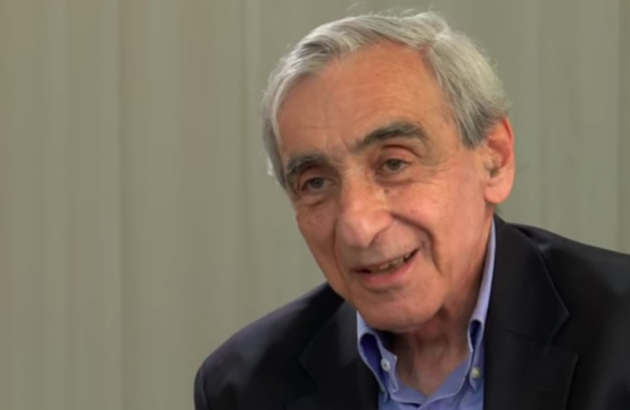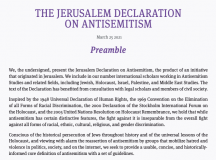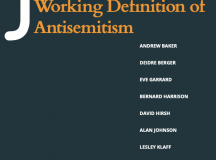Michael Walzer is Professor Emeritus of Social Science at the Institute for Advanced Study, Princeton University. For many years he was the co-editor of Dissent magazine. He responds here to Cary Nelson’s essay ‘Accommodating the New Antisemitism: A Critique of the Jerusalem Declaration’ published last week in Fathom. Michael was a signatory of the Declaration. For the reply to Nelson of another signatory, Derek Penslar, see here.
Cary Nelson knows a lot more about antisemitism and about its various definitions than I do; many of the arguments I have made in print and in talks derive from his incisive critical work Israel Denial. But I hope he is wrong to suggest that some people have signed on to the Jerusalem Declaration on Antisemitism (JDA) because I did. As he says, JDA, like IHRA, can be misinterpreted. The couple of antisemitic signatories that he lists are our mis-interpreters; the organisers in Jerusalem should have rejected their signatures. But the rest of us, I assume, were working from our own experience and not from anyone else’s.
Different experiences will produce different views on the three (not entirely different) definitions. We owe each other explanations for our own views; mutual engagement after that would be fine, but I hope that we can save our fiercer fire for the ongoing fights against Israel denial in universities, corporations, unions, and political parties here and abroad.
I thought that JDA offered to create a little distance, nothing more, between antisemitism and the Israel/Palestine battles. I know that the two often overlap, and I am ready to call out attacks on Zionism and Israel that are substantively antisemitic. Alan Johnson’s indictment of Labor Party antisemitism illustrated the overlap, and nothing in JDA would prevent me from recognising it. But antisemitism and Israel/Palestine don’t always overlap, and there are strategic reasons for keeping a little distance between them.
My activism is limited these days, but I have been involved in opposing BDS on several American university campuses and in one of the academic associations. I have found that very few of my opponents in these battles were antisemites — and calling them that was not a winning strategy. Addressing their arguments, defending the Zionist project: that was the way to win.
Consider the argument for ‘one state for all its citizens’. That means the end of the Jewish state — an antisemitic position, right? But on the campuses I know, it isn’t that. It is supported by a growing number of Jewishly committed students, responding to the sharp right turn of Israeli politics. And for American kids, ‘a state for all its citizens’ is exactly what America is supposed to be. So the right question isn’t ‘Are we dealing with antisemites here?’ but rather, ‘Why doesn’t this argument apply to Israel/Palestine?’ It seems to me that the IHRA definition, for all its qualifications and conditional verbs, pushes us toward the wrong question.
Some anti-Zionists may have signed on to the JDA because of their experience of being called antisemitic when they are sure that the label doesn’t accurately describe their views. They have every right to contest the label, which is sometimes applied with due care and sometimes not. At the same time, the JDA leaves me plenty of room to condemn their anti-Zionism as the wrongheaded politics it often is, without looking too deeply into their motives or their feelings. As the first Queen Elizabeth wrote, ‘I would not make a window into men’s souls, to pinch them there.’
Denying the Jewish right to political self-determination is an old Jewish position, defended within historical memory by Orthodox and Reform Jews. There are today Jewish defenders of the Diaspora, who believe that the centuries of statelessness have been a kind of moral education — and that we are now a post-Westphalian people, too good to manage the brutalities that sovereignty requires (or certain to manage them badly). We should therefore settle for something less than sovereignty in the Middle East, which would actually be, from a moral standpoint, something better. I know some non-Jews who have adopted this position, perhaps not entirely in good faith — but who knows? So far as I know, none of these positions has found a place in the debates about the meaning of antisemitism — which they would surely complicate. I think that ‘diasporism’ derives from a radical misunderstanding of Jewish history. Talking about antisemitism or its Jewish version, self-hate, wouldn’t be helpful.
The current debate also hasn’t focused on forms of antisemitism that have nothing to do with Israel/Palestine. In the US today, the greatest threat to Jewish life and limb comes from the advocates of ‘replacement theory’ — which holds that the Jews, through the agency of HIAS, are bringing Mexicans and Muslims into the country in order to replace, or displace, White Christian Americans. This ‘theory’ inspired the Charlestown marchers and the murderous attack on the Pittsburgh synagogue, and it now has a foothold in the Republican Party. We would all agree that this is antisemitism, but because we are so focused on the arguments about when and whether anti-Zionism crosses the line, it hasn’t gotten the attention it deserves.
So, a little distance would help.
Note: For more of an argument along these lines, please see my article ‘Anti-Zionism and anti-Semitism’ in Fathom.
Michael Walzer






































As usual, Prof. Walzer offers astute and humane remarks, which perform a valuable service in responding to Cary Nelson and other critics of the JDA. I believe, though, that he meant in the last of the longer paragraphs to write the “marchers on Charlottesville” (not “Charlestown”).